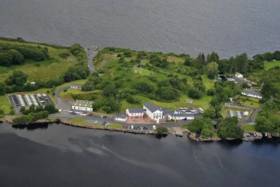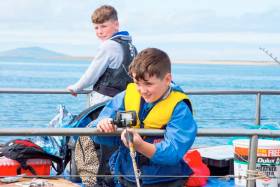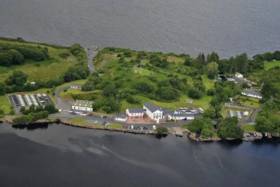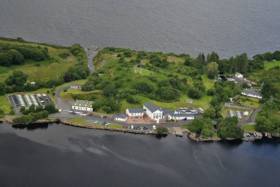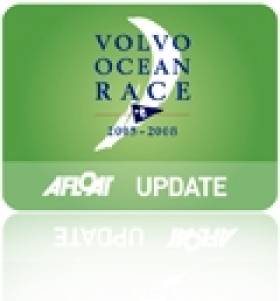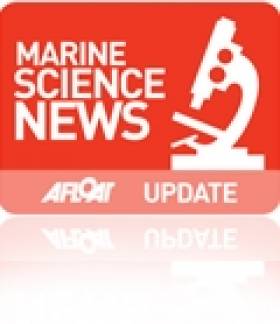Displaying items by tag: Newport
Marine Institute’s Newport Base Open To The Public This Sunday
The Marine Institute’s research facility in Newport, Co Mayo will open its doors to primary school children this week and to the general public for an open day this Sunday 14 April from 11am to 4pm.
Primary pupils from Newport, Kilmeena, Carrowaholly, Glenhest, Knockroosky and Snugboro schools in Co Mayo will visit the Newport Catchment Facility on today and tomorrow (Wednesday 10 and Thursday 11 April) to speak with marine scientists and view the freshwater hatchery and fish rearing facilities on site.
A number of PhD candidates will also be available to talk to students about their subject choices and potential careers in the marine sector.
Beavers and cubs from the Westport and Ballyhaunis Scout groups will have an opportunity to tour the facility this Saturday 13 April.
And the open day at Newport Catchment Facility thus Sunday offers an opportunity for visitors to view the facilities in the Burrishoole Valley and learn more about the research taking place at the site.
A range of cutting-edge research is undertaken at the Newport Catchment Facility including genetics work across several species of salmon, sea bass, pollock and bluefin tuna, as well as research on catchment ecosystems events, climate change, oceanography and aquaculture.
Marine Institute chief executive Dr Peter Heffernan said: “We welcome visitors to our Newport facility to see the work that is being undertaken by scientists and postdoctoral students that not only contributes to national research, but also has international relevance.
“Our open day is also an opportunity to engage the public and increase awareness of the value and opportunities of our marine resource, a goal of Ireland’s marine plan Harnessing Our Ocean Wealth.”
Newport Junior Sea Anglers To Benefit From Free Fishing Equipment
#Angling - Sean Canney, Minister of State with responsibility for inland fisheries, has welcomed the success of Newport Sea Angling Club in Co Mayo in securing fishing equipment for junior anglers in the community.
Along with many others around Ireland, including the Finglas Youth Resource Centre in north Dublin, the club received funding from Inland Fisheries Ireland’s National Strategy for Angling Development to help support the recruitment of novices to the pursuit of angling.
Minister Canney said: “Newport Sea Angling Club has a strong junior membership hosting multiple events for young anglers every year. The club provides novice anglers with equipment, tackle, rods and life jackets during junior events.
“This helps in promoting angling to a new generation and also ensures that parents do not have to invest in any equipment until children have tried angling a number of times.
“I am happy to see Inland Fisheries Ireland stand behind the Newport club’s excellent initiative and I am confident their efforts will bring new participants into this healthy outdoor pastime.”
The club’s youth outreach initiatives attract many junior anglers with up to 60 juniors attending their National Junior Competition every year.
This new equipment will assist the club in training novice anglers in sea angling skills. In addition to fishing equipment, the club will also purchase a projector and screen for the club which will be used to assist them in theoretical training sessions.
Declan Moran of Newport Sea Angling Club said: “We hope that we can remove any pressure on parents or guardians to purchase angling equipment at the outset until their child has tried the pursuit and intends to continue with it. We believe this is one of the reasons why the club is so successful in introducing many young novice anglers to sea fishing each year.
“At Newport Sea Angling Club, we are committed to helping the next generation of anglers by passing on the necessary angling skills and introducing them to the pursuit in a safe and friendly environment.”
Suzanne Campion, head of business development at Inland Fisheries Ireland, said: “Newport Sea Angling Club has a long history of supporting junior anglers with a number of popular junior events held in Newport every year. We are delighted to support the club through the National Strategy for Angling Development fund to enable the purchase of more fishing equipment.
“I would like to take this opportunity to congratulate them on their work to date in recruiting new junior members and we look forward to seeing even more growth in sea angling in Newport and the surrounds in years to come! By increasing participating in angling among the next generation, we are securing the future of our precious and valuable natural resource.”
The Marine Institute’s Research Facility in Furnace, Newport, Co Mayo will open its doors on Saturday 14 April from 11am to 4pm.
The open day is for all, and visitors will have the opportunity to view the facility for studying migratory fish, located in the Burrishoole Valley.
Visitors will be able to learn more about the history of the facility and the marine science projects taking place at the site.
They will also have the opportunity to speak with researchers, scientists and staff at the Newport facility. A number of PhD candidates will be available to talk to students about their subject choices and potential careers in the marine sector.
Visitors can look through microscopes to see freshwater invertebrates, view fish species up-close in the aquarium displays and learn how to read a salmon scale.
There’s also the chance to visit the manual climate station and see the instruments used to collect daily data for Met Éireann.
The Marine Institute describes its facility in Newport as “a unique research centre” where a range of research is undertaken, including genetics work across several species of salmon, sea bass, pollock and bluefin tuna, as well as studies on catchment ecosystems events, climate change, oceanography and aquaculture.
The facility, which has been in operation since 1955, includes laboratories, a freshwater hatchery, fish rearing facilities, fish census trapping stations, a salmonid angling fishery and a monitored freshwater lake and river catchment.
Taoiseach Announces €6M Investment & 20 New Jobs At Co Mayo Marine Research Facility
#MarineScience - Taoiseach Enda Kenny today (Saturday 28 January) announced the creation of 20 new jobs and a €6 million investment in the Marine Institute's facility in Newport, Co Mayo.
The 20 new positions will be based at Newport research facility where they will be engaged in a number of projects funded from a secured pot of €6 million in research grants from a number of agencies including the Science Foundation Ireland, Interreg, EU H2020/European Research Council, European Maritime and Fisheries Fund (EMFF) and the British Research Council.
Speaking in Furnace, near Newport, the Taoiseach — who is also TD for Mayo — said the move “is very timely following the launch of Realising our Rural Potential – the Action Plan for Rural Development earlier this week.
“The Newport facility is a real example of innovation taking place in a rural community and creates exciting opportunities both now and in the years ahead.
“Scientists at doctoral and post-doctoral level working at the facility are involved in conducting research with not only national implications, but also international relevance. In other words, it firmly brings what is a rural area into a national and international context.”
The Taoiseach added: “This is a relatively unique research facility in operation since 1955 and I am delighted to see the continued excellent quality research that is taking place following €6 million in funding from research grants.
“I also wish to thank the Marine Institute and their educational partners for their efforts in building a strong international reputation for marine research and innovation."
The Marine Institute says a range of cutting edge research is carried out at its Newport facility including genetics work across several species of salmon, sea bass and pollock, research on the catchment, and climate change.
The facility is attracting multiple Irish Higher Education Institutions and international partners including University College Cork, Queens University, University College Dublin, GMIT, Dundalk Institute of Technology, NUI Galway and the University of Glasgow.
In addition, the Marine Institute is working with Mayo County Council to actively develop new initiatives at the facility to further enhance what the Marine Institute can offer and benefit the local area.
Supporting the announcement, Marine Minister Michael Creed said that his department and the fishing industry consider pollock “a very important commercial species for some elements of the Irish fleet. It is good to see a new project on this species being carried out in Newport, using the scientific expertise that is there."
Marine Institute chief executive Dr Peter Heffernan added: "Ireland has been gaining a reputation in Europe, and internationally for its marine research and innovation, and for driving collaboration in this area. We have a strong marine research community supported by growing national research infrastructure.
“This €6 million investment programme will see the Marine Institute expand its research capacity at its Newport facility and the continued investment in marine research will ensure that Ireland stays at the cutting edge of research and innovation."
In his own welcoming statement, Mayo county manager Peter Hynes said: "This is fantastic news for Mayo and the West region and Mayo County Council looks forward to continuing to work with the Marine Institute to further develop this cutting edge research facility here in Newport."
Newport Makes It Six For VOR 2014-15 Host Ports
#VOR - Newport in Rhode Island has been announced as the latest stopover for the next edition of the Volvo Ocean Race in 2014-15.
The popular sailing base in the 'Ocean State' will be the North American port on the race route for its 12th running as the end point of the leg from Itajaí in Brazil, and is hosting the event for the first time.
"It's about time the race came to the city of Newport and we are looking forward to a real festival that will delight and inspire sailing fans and those who are new to the sport," said Volvo Ocean Race CEO Knut Frostad at the announcement.
Conveniently located between the Irish-American hotspots of New York City and Boston, the crowds in attendance are sure to feature a prominent 'green' element.
As reported at the weekend on Afloat.ie, Gothenburg in Sweden has been awarded the honour of hosting the VOR finale, much to the disappointment of Galwegians after last summer's successful event.
Prince Albert II of Monaco to Visit Marine Institute
Prince Albert's visit to the Marine Institute headquarters in Oranmore will be held on the final day of the visit on 6 April. Prior to that the prince will hold meetings with An Taoiseach, Enda Kenny, minister for the marine, Simon Coveney, minister for the environment, Phil Hogan and Dublin's Lord Mayor, Gerry Breen.
The Head of Monaco will open an exhibition in honour of his late mother at Farmleigh House and the prince will host a reception to highlight Irish literature and art. In addition to honouring the royal visit a state dinner will be held by President Mary McAleese.
The world's second smallest state is home to the Musée Océanographique de Monaco which has an impressive collection of aquariums. Though the principality is more synonymous with the hosting of Formula 1 Grand Prix. The event is at the end of May and is expected to attract a higher than usual number of cruiseships totalling 12 cruise-calls.
Mostly they will be on charter and accompanied by mega-yachts which are to dock at the outer pier or anchor offshore and along the French Riviera at Villefranche, Nice and Cannes. At the far side of summer Monte Carlo's Port Hercule is also to host the Monaco Yacht Show in September.
- Newport
- Marine Institute
- Co. Galway
- Monaco Yacht Show
- Cruiseships
- Ports and Shipping News
- Oranmore
- Galway Bay News
- Cruisecalls
- Prince Albert II
- Prince Albert of Monaco
- Prince Rainier III
- Princess Grace
- Grace Kelly
- Hollywood
- Port Hercule
- Principality
- Co.Mayo
- Charle Wittstock
- Formula 1
- Grand Prix
- Megayachts
- Musée Océanographique
Ho Ho Hold-up
Yacht clubs in snowy weather are even odder than snow resorts in summer. But in America's sailing Mecca of Newport, Rhode Island, there was a further inversion at the East Providence Yacht Club on Sunday night after the annual pre-Christmas party reports W M Nixon.
Only a lone barman was left on the premises, and when a large fat white-bearded man dressed in red and carrying a sack came bustling in, he smiled a cheerful welcome. But the new arrival immediately brandished a gun, and by the time the police arrived he had cleared out all the weekend takings – "a lot" – and had made good his escape to the sound of jingling bells.



























